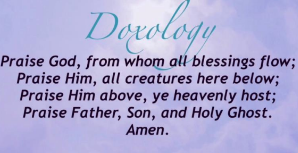The Doxology
RefLection:
Here at Clover Hill Reformed Church, we sing the Doxology each Sunday and it turns out from what I’ve been reading, so do many Church communities of various Protestant denominations.
I think it’s safe to say that if we were asked: “What’s a Doxology?” most of us would refer to what we sing every Sunday, but might not know why we call it a Doxology or what the word’s origin is or what it means. Don’t worry, hopefully after reading this you’ll have a little more info in case the question ever comes up on Jeopardy!
Let me share with you some information about the word Doxology. First, it’s brought to us from the Latin word doxologia, which was derived from the Greek words: doxo which means glory, grandeur, or splendor and logos which means, word or speaking.
So how did we get the Doxology that we sing?
My research reveals that it was written by an Anglican Bishop, Thomas Ken. In 1694 Thomas Ken printed a revised manual for morning and evening prayers that included a hymn called A Morning Hymn. It was revised from a 15-verse hymn to a 12-verse hymn. Yes, you read that correctly. Imagine if we had to sing that whole hymn every Sunday!! Luckily all we sing is the Doxology, which ended the hymn making it the 13th verse! The words of that Doxology are a little different than the version we use at CHRC.
The original text is:
If I had to define Doxology, I’d say: In general, Doxology means a short verse praising God and beginning, as a rule, with the Greek word Doxa. However, it might be easier if we just think of a doxology as a short hymn of praise to the Triune God. Way shorter than 13 verses!
Did you know that there is more than one doxology? In our Sunday liturgies at CHRC we sing two doxologies. We sing one we call the Doxology and the “Lesser Doxology” known as the Gloria Patria from the Latin for Glory to the Father. In some denominations this Doxology is used at the end of Psalms and Canticles in Morning, Daytime, and Evening prayer.
The Gloria in Excelsis (Glory to God in the Highest) is also considered a Doxology and can be found in our hymnal at #566. Since this is actually a Presbyterian hymnal, I presume they use it in their liturgies. Catholics and Episcopalians also use it.
So, singing the Doxology is a way that we pray in union with other Christians each Sunday even though we may not be physically with them. Let us continue to give God the Glory.
Sincerely in Christ,
George Farrell, Minister of Music


